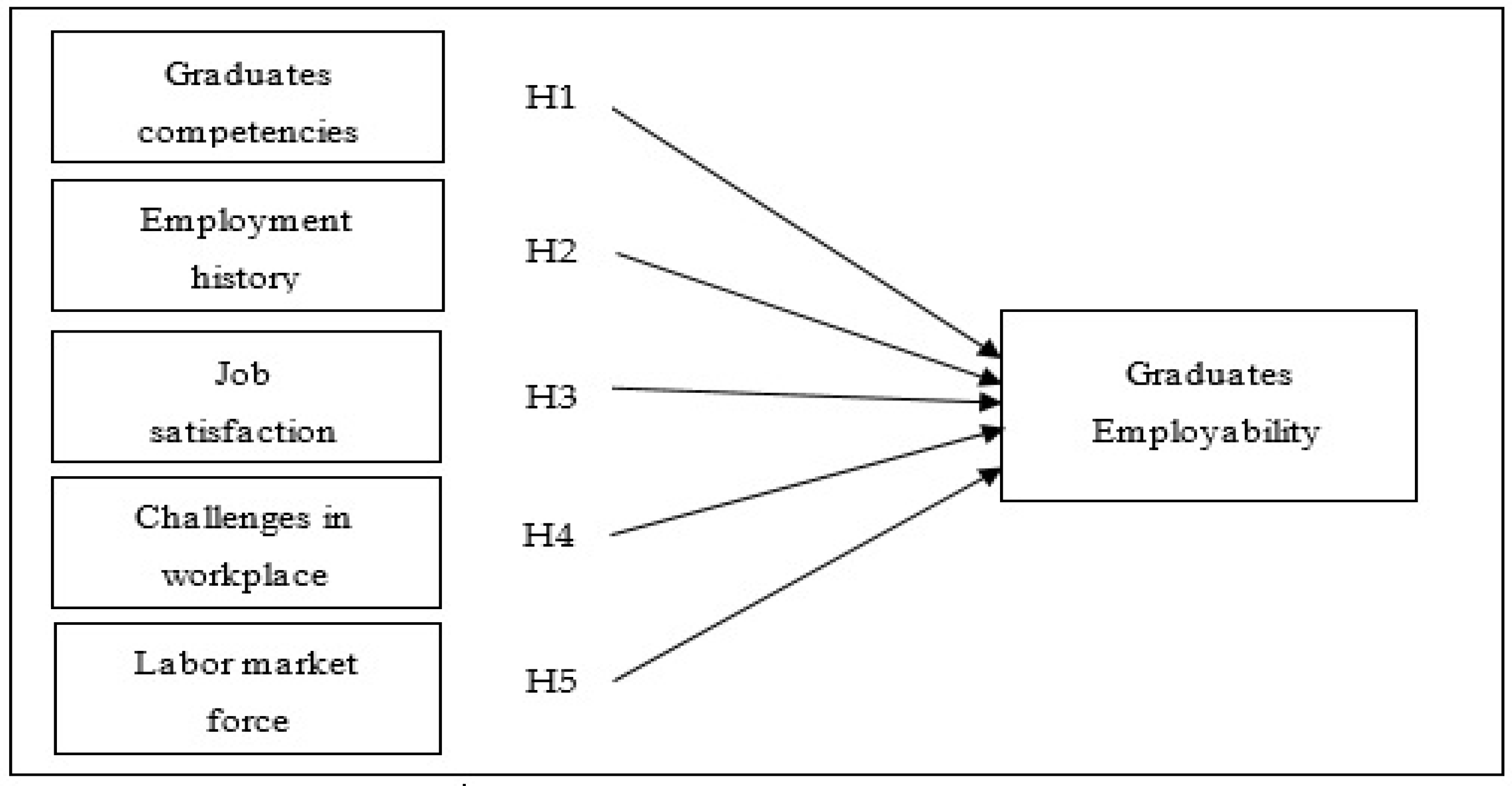Graduates’ Competencies and Employability: A Conceptual Framework †
Abstract
:1. Introduction
2. Literature Review
2.1. Graduates’ Competencies
2.2. Employability
3. Conceptual Model
4. Conclusions
Author Contributions
Funding
Institutional Review Board Statement
Informed Consent Statement
Data Availability Statement
Acknowledgments
Conflicts of Interest
References
- Yorke, M. Employability in Higher Education: What It Is—What It Is Not. Learning and Employability Series One; ESECT and HEA: York, UK, 2006; Available online: http://www.heacademy.ac.uk/assets/York/documents/ourwork/tla/employability/id116_ employability_in_higher_education_336.pdf (accessed on 10 August 2012).
- Hosain, M.S.; Mustafi, M.A.A.; Parvin, T. Factors Affecting the Employability of Private University Graduates: An Exploratory Study on Bangladeshi Employers PSU Research Review. 2021. Available online: https://doi-org.ezaccess.library.uitm.edu.my/10.1108/PRR-01-2021-0005 (accessed on 21 June 2012).
- Hack-Polay, D.; Igwe, P.; Okolie, U.C. Room for improvement: A study of overconfidence in numerical skills among British graduates. Ind. High. Educ. 2020, 34, 50–61. [Google Scholar] [CrossRef]
- Thompson, E. Customer Relationship Management: Making the Vision A Reality; Gartner. Inc.: Sofitel Rive Gauche, France, 2001. [Google Scholar]
- Tay, A. Managing generational diversity at the workplace: Expectations and perceptions of different generations of employees. Afr. J. Bus. Manag. 2011, 5, 249–255. [Google Scholar]
- Harvey, L. Defining and measuring employability. Qual. High. Educ. 2001, 7, 97–109. [Google Scholar] [CrossRef]
- Lan, M.T.Q. Graduate generic competences from the perspective of VNU employers. J. Teach. Learn. Grad. Employab. 2020, 11, 131–145. [Google Scholar] [CrossRef]
- Purcell, K.; Elias, P.; Davies, R.; Wilton, N. The Class Of ‘99: A Study of The Early Labor Market Experience Of Recent Graduates; DfES Research Report No. 691; DfES Publications: Nottingham, UK, 2004. [Google Scholar]
- Rahman, S.A.; Lie, K.Y. Graduate Competencies: Issues and Solutions of Graduate Employability in Malaysia. In Technology and Workplace Skills for the Twenty-First Century; Neubauer, D.E., Ghazali, K., Eds.; International and Development Education; Palgrave Macmillan: New York, NY, USA, 2015. [Google Scholar] [CrossRef]
- Shukran, A.R.; Munir, S. Graduate employability and graduateness: An overview of concepts, interpretations and emerging issue. Int. Proc. Econ. Dev. Res. 2011, 23, 183–188. [Google Scholar]
- Lees, D. Graduates Employability-Literature Review. Available online: http://www.qualityresearchinternational.com/esecttools/esectpubs/leeslitreview.pdf (accessed on 21 April 2012).
- Hillage, J.; Pollard, E. Employability: Developing a Framework for Policy Analysis; Research Report. No. RR85 (London, DfEE); Department for Education and Employment (DfEE): Suffolk, UK, 1998; Available online: https://www.voced.edu.au/content/ngv:40352 (accessed on 1 May 2012).
- Psacharopoulos, G.; Schotter, M. Skills for Employability, Economic Growth and Innovation: Monitoring the Relevance of Education and Training Systems. Expert Network on Economics of Education (EENEE). 2004. Available online: http://www.eenee.de/docs/employability (accessed on 3 June 2012).
- Willard, P.; Wilson, C.S.; Cole, F.T.H. Changing employment patterns: An Australian experience. Educ. Inf. 2003, 21, 209–228. [Google Scholar]
- Zaharim, A.; Yusoff, Y.M.; Omar, Z.; Mohamed, A.B.; Muhamad, N.; Mustapha, R.; Ehsan, D. Employers Perception towards engineering employability skills in Asia. WSEAS Trans. Adv. Eng. Educ. 2009, 9, 306–315. [Google Scholar]
- Raybould, J.; Sheedy, V. Are graduates equipped with the right skills in the employability stakes? Ind. Commer. Train. 2005, 37, 259–263. [Google Scholar] [CrossRef]
- Rayton, B.A. Examining the interconnection of job satisfaction and organizational commitment: An application of the bivariate probit model. Int. J. Hum. Resour. Manag. 2006, 17, 139–154. [Google Scholar] [CrossRef]
- Sharma, R.D.; Jyoti, J. Job satisfaction among school teachers. IIMB Manag. Rev. 2006, 18, 349–363. [Google Scholar]
- Williamson, J.M.; Pemberton, A.E.; Lounsbury, J.W. An investigation of career and job satisfaction in relation to personality traits of information professionals. Libr. Q. 2005, 75, 122–141. [Google Scholar] [CrossRef]
- Elisha, O.M. Contemporary issues in information management: A fresh look for information professionals. Int. J. Libr. Inf. Sci. 2009, 1, 082–091. [Google Scholar]
- Thomas, V.K.; Satpathi, C.; Satpathi, J.N. Emerging challenges in academic librarianship and role of library associations in professional updating. Libr. Manag. 2010, 31, 594–609. [Google Scholar] [CrossRef]
- Ingrassia, R. Labor Market Imbalances and Personnel Recruitment. Am. J. Ind. Bus. Manag. 2019, 9, 1376–1394. [Google Scholar] [CrossRef]
- Johnston, B. The shape of research in the field of higher education and graduate employment: Some issues. Stud. High. Educ. 2003, 28, 413–426. [Google Scholar] [CrossRef]

Publisher’s Note: MDPI stays neutral with regard to jurisdictional claims in published maps and institutional affiliations. |
© 2022 by the authors. Licensee MDPI, Basel, Switzerland. This article is an open access article distributed under the terms and conditions of the Creative Commons Attribution (CC BY) license (https://creativecommons.org/licenses/by/4.0/).
Share and Cite
Mokhtar, S.A.; Arifin, N.A.M.; Rosman, M.R.M.; Abdullah, N.; Fadzil, F.H.; Isa, A.M. Graduates’ Competencies and Employability: A Conceptual Framework. Proceedings 2022, 82, 54. https://doi.org/10.3390/proceedings2022082054
Mokhtar SA, Arifin NAM, Rosman MRM, Abdullah N, Fadzil FH, Isa AM. Graduates’ Competencies and Employability: A Conceptual Framework. Proceedings. 2022; 82(1):54. https://doi.org/10.3390/proceedings2022082054
Chicago/Turabian StyleMokhtar, Siti Aishah, Noor Arina Md Arifin, Mohamad Rahimi Mohamad Rosman, Nurulannisa Abdullah, Faizal Haini Fadzil, and Azman Mat Isa. 2022. "Graduates’ Competencies and Employability: A Conceptual Framework" Proceedings 82, no. 1: 54. https://doi.org/10.3390/proceedings2022082054
APA StyleMokhtar, S. A., Arifin, N. A. M., Rosman, M. R. M., Abdullah, N., Fadzil, F. H., & Isa, A. M. (2022). Graduates’ Competencies and Employability: A Conceptual Framework. Proceedings, 82(1), 54. https://doi.org/10.3390/proceedings2022082054





